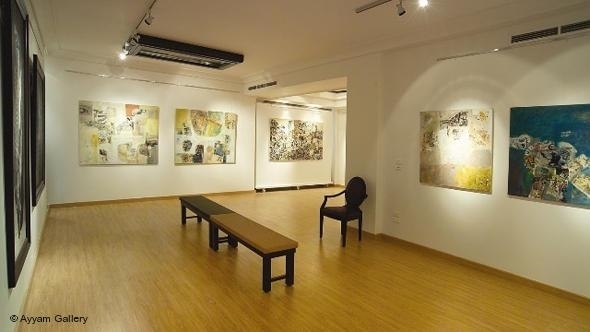Since the Baath party came to power in Syria and began controlling all political and cultural activity, the cultural institutions in Syria were deprived of the freedom to expand in literature, art, and other forms of cultural expression, which were strictly censored by various intelligence agencies.
Intelligence agencies channeled the path of culture into a direction that served the regime’s interests, strangling anyone who tried to rebel against these limitations.
The regime left a small, controlled space for creativity by planting its people in all cultural institutions and centers. Newspapers, for example, were given only a small space for artistic and literary writing. They published essays which were often already published in other newspapers, and most discussed politics in a way that improved the regime’s image and its domestic and foreign activities, while other topics were written with a tone set by the regime.
In the literary field, Syrians were handpicked by the intelligence agencies. Some used their connections to enter this field, while others praised the regime even at the cultural level, making them part of the cultural scene throughout the years. Thus, young creative writers faded in the shadows of this octopus whose tentacles controlled all the cultural fields, forced to publish their writings abroad.
It is common knowledge that free writers were often arrested for a political or a literary statement that would be misinterpreted by some intelligence agent. They would be imprisoned for a long time without trial. This happens in authoritarian countries, where intellectuals are not allowed to express their own opinions or the public opinion, even about cultural issues.
Literary works that did not pass through the Writers’ Union, the Ministry of Culture, or private publishers, had to be censored, only to be read and then rejected. Sometimes censors would delete large sections or reject the entire work without even consulting with the writer. Such things happened often to famous writers in the Syrian literary milieu.
Censorship was not only practiced by intelligence agencies – it had become entrenched among those who believed they controlled the cultural field. For instance, the chief editor of a newspaper or the head of the literary department could publish whatever they wanted. This depended on their moods or nepotism, which played a major role in this field.
When we talk about this subject, we should point out that favoritism only affected one type of person. The rest were neglected, as if creativity was limited to a certain type. One could say that most people in Syria were only concerned with putting food on their tables, even though Syria was considered to be a wealthy country.
When Bashar al-Assad inherited power from his father, Syrians believed he was a young, more civilized and more intellectual leader than his father. But after just the first few months of his rule, all the signs of openness to the West and of Syrian youths’ ambitions for change had faded.
Some might point out that information services like the Internet and cellphones began during his era, which is correct. But this was only used as a new rope used to strangle the people with, and coupled with strict oversight by intelligence agencies. Although information services were considered a right, Syria was the last country in the area to provide them, despite Syria’s comparatively large economic capabilities under regime control.
The Syrian cultural scene was expanded under Assad's information services, but it was still limited, since openness to the world could not be allowed to threaten the state security, as the intelligence services understood it.
For instance, there were some books and names that could never be mentioned or even whispered. Yet intellectuals and ordinary people could find these books online, read them, and learn of a new world that they could not have dreamed about before. This was one space left open by the regime to allow the people to vent their frustrations while remaining under strict oversight.
Eventually, the regime began to show interest in the cultural scene. It began promoting itself through cultural programs, literary competitions, and TV seminars designed to appeal to the youth. This was an attempt to improve the image of the Syrian regime and wipe away the social and psychological destruction it wrought on all Syrians.
New names began appearing in Syrian newspapers, in addition to awareness and relief campaigns across the country, which the regime employed to appear legitimate to the world. Indeed, there are many Syrians who still support the regime, and want to help it rebuild the country.
Syrian and foreign observers of the Syrian cultural scene may have observed substantial changes in Syria’s creativity. But all writers and artists who left Syria during or even before the revolution are now considered traitors, and they are unable to discuss culture or any other Syrian issue.
......


